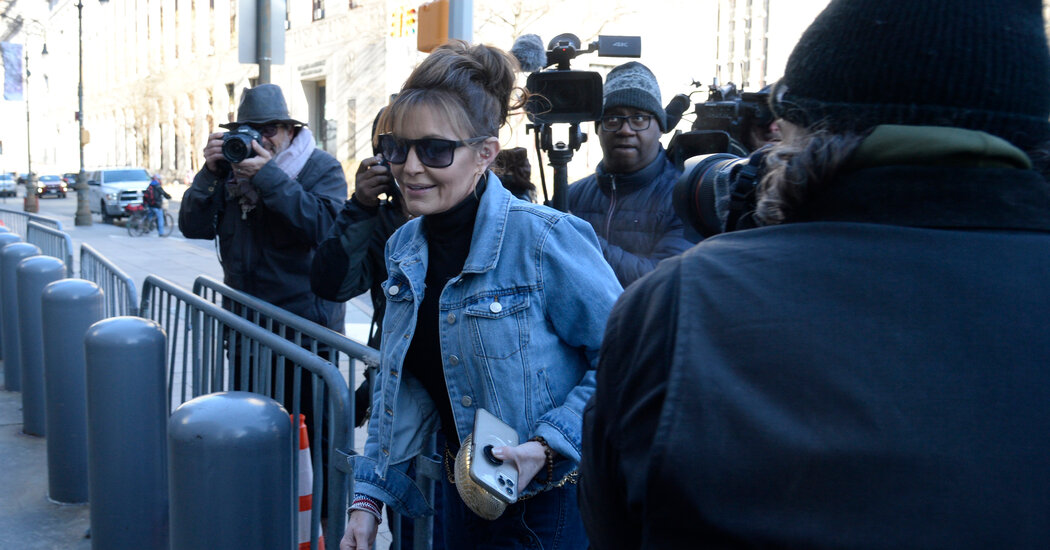A jury rejected Sarah Palin’s libel suit against The New York Times on Tuesday, finding that there was insufficient evidence to prove the newspaper had defamed her in a 2017 editorial that erroneously linked her political rhetoric to a mass shooting.
The jury’s verdict, which First Amendment advocates applauded as a victory for the longstanding legal precedent that considers an occasional journalistic mistake a necessary cost of discourse in a free society, was the second time this week that Ms. Palin’s case was dealt a significant setback. On Monday, the presiding judge in federal court in Lower Manhattan, Jed S. Rakoff, reached a similar finding as the jury. He said that he would dismiss the case if the jury found in her favor because she had not demonstrated The Times acted with the level of recklessness and ill intent required to meet the high constitutional burden for public figures who claim defamation.
Ms. Palin is expected to appeal.
The case set up a high-stakes test of First Amendment law and the extremely high legal bar that the Supreme Court has set for proving a defamation claim against journalists. Lawyers for Ms. Palin, the former governor of Alaska and 2008 Republican vice-presidential nominee, argued that the longstanding legal protections in place to shield journalists from liability for almost any error that wasn’t intentional are outdated and overly broad. A public figure like Ms. Palin has to prove that a news organization acted with “actual malice” in publishing false information, meaning it displayed a reckless disregard for the truth or knew the information was false.
The Times has not lost a libel case in an American courtroom in at least 50 years.
“It is gratifying that the jury and the judge understood the legal protections for the news media and our vital role in American society,” a spokeswoman for The Times, Danielle Rhoades Ha, said in a statement, adding that the verdict upheld “a fundamental tenet of American law.”
Ms. Palin’s lawyers may get another chance to argue why those protections should be pared back on appeal. Legal experts said that one avenue for asking an appeals court to reconsider the case is to ask that the courts revisit the broad manner in which the law defines a public figure.
Ms. Palin’s suit claimed that The Times defamed her with an editorial that incorrectly asserted a link between her political rhetoric and a mass shooting near Tucson, Ariz., in 2011 that left six people dead and 14 wounded, including Gabrielle Giffords, then a Democratic member of Congress. Ms. Giffords’s district had been one of 20 singled out on a map circulated by Ms. Palin’s political action committee underneath digitized cross hairs. There was no evidence the shooter had seen or was motivated by the map.
The editorial was published on June 14, 2017, the same day that a gunman opened fire at a baseball field in Virginia where Republican congressmen were practicing, injuring several people, including Representative Steve Scalise of Louisiana. The headline was “America’s Lethal Politics,” and the editorial asked whether the Virginia shooting was evidence of how vicious American politics had become. The Times corrected the editorial the morning after it was published after readers pointed out the mistake.
On the witness stand, the former Times editor who inserted the erroneous wording into the article, James Bennet, testified that the incident left him racked with guilt and that he had thought about it almost every day since. “It was just a terrible mistake,” he said.
Ms. Palin and her lawyers attempted to convince the jury that Mr. Bennet had acted out of animus toward her and, regardless of any contrition he later showed, was reckless in rushing to judgment about her.
Judge Rakoff rejected those claims in his ruling on Monday, saying that Ms. Palin had not produced evidence to support the idea that Mr. Bennet disregarded the truth either willfully or through his own recklessness. The ruling came in response to a routine procedural motion by Times lawyers to rule in its favor, which defendants have a right to do after the plaintiff has presented all of its evidence to the jury.


























